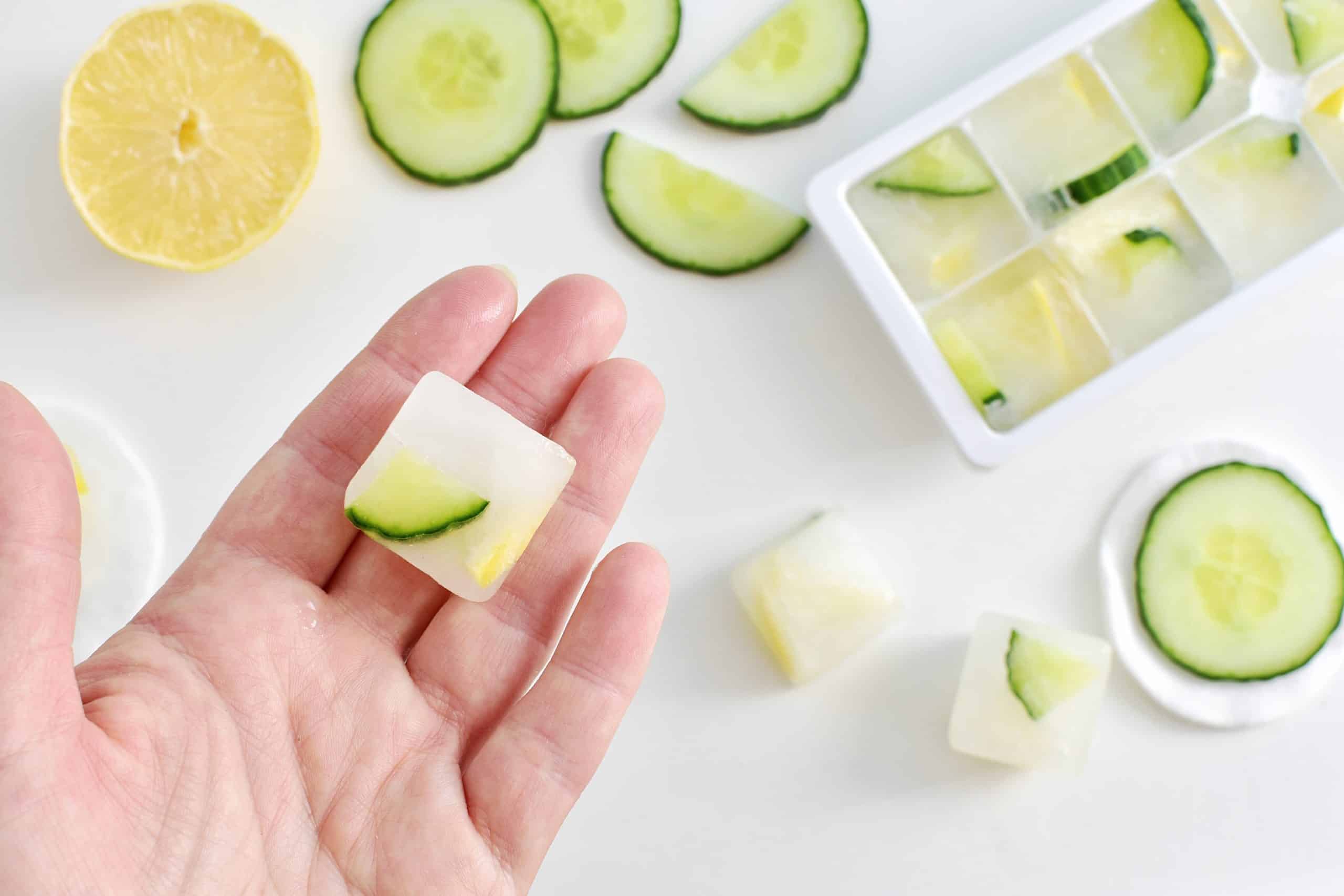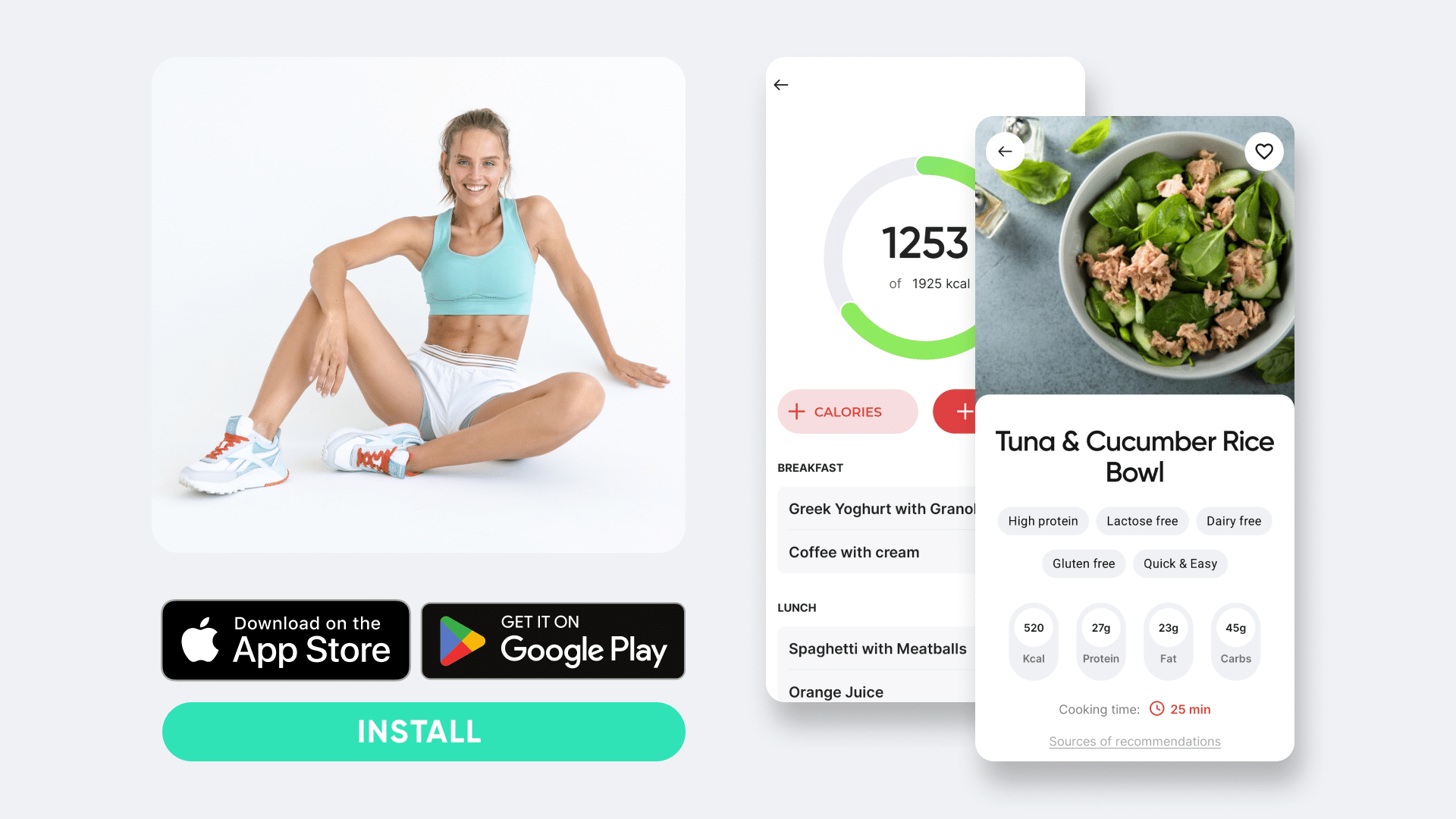The Ice Hack for weight loss is a latest TikTok sensation. By simply incorporating ice into your diet or by taking cold showers, this method is claimed to aid in weight loss. That said, there’s not much to research to back these claims. Keep reading to learn all about this new fad diet trend.
What is an Ice Hack for Weight Loss?
The ice hack diet is a weight loss approach based on the addition of cold elements into our diet and lifestyle. It is not limited to adding ice to our diet, and having cold foods and beverages but also includes exposing our body to low temperatures, like taking ice baths, cold showers, and applying ice packs to the body.
What’s the theory behind this? When exposed to cold temperatures, our body needs to keep our internal temperature constant. This process is known as thermogenesis (1), a vital part of the homeostasis (2) process, our body’s ability to regulate internal conditions to preserve life and optimal function.
The underlying principle is that we could burn more calories by promoting thermogenesis. While intriguing, the scientific evidence supporting this weight loss approach is limited.
What Is the Ice Method for Weight Loss?
The ice hack diet, a fairly new and viral TikTok trend, claims to promote rapid weight loss through excessive cold exposure. It is suggested that, by eating tons of ice, drinking ice-cold beverages, and taking part in cold activities, you may boost your calorie burn by exploiting your body’s thermogenesis process. To what extent this fad diet contributes to significant weight loss remains unproven.
Fad diets often simplify the complexity of weight loss and weight management, and they forgo the fundamental aspects of health, such as balanced nutrition and regular exercise (3). If you’re thinking of trying the Ice Method for weight loss, it would be good to consult a healthcare provider first.
The BetterMe: Health Coaching app will provide you with a host of fat-frying fitness routines that’ll scare the extra pounds away and turn your body into a masterpiece! Get your life moving in the right direction with BetterMe!
Key components of the ice hack diet include:
The guidelines for the hack diet are pretty straightforward:
- Diet-related: go for cold foods and beverages as much as possible, adding ice into drinks and meals.
- Environment-related: exposure to low temperatures with cold showers, ice baths, wearing cooling garments, and applying ice packs throughout the day.
- Supplement-related: some promote specific supplements, such as Alpilean. According to the manufacturers, the ingredients can raise our internal body temperature, thus boosting our metabolism. However, this claim has not been evaluated by the FDA (4).
Does the Ice Hack Really Work for Weight Loss?
The ice hack diet has gained significant traction online. Some evidence suggests that cold exposure could promote increased thermogenesis and temporarily boost metabolism (5).
While this concept may be refreshing and scientifically sound, the evidence for it related to weight loss is lacking and it shouldn’t be chosen as a primary weight loss strategy. Individual factors like genetics, metabolism, and overall lifestyle also influence weight management outcomes (6).
The effect on our metabolism and overall energy expenditure, and thus, the impact on weight it’s minimal compared to a holistic weight loss approach. Significant weight loss and successful weight management come from the combination of balanced nutrition, regular exercise, stress, and sleep management, among other factors (7).
Remember that speaking to a healthcare provider is essential when making significant dietary changes.
Read more: Shed Pounds and Boost Confidence with This Beginner Running Plan for Weight Loss
What is the effect of the Ice Hack in our Body?
Metabolism includes our body’s processes that convert food into energy for vital functions and determines how efficiently our body utilizes calories (8). Partly dictated by our genetics, age, sex, body composition, and physical activity level, for the most part, it’s outside our control.
While the relationship is complex and there is considerable debate as to whether external factors can affect our metabolism, a faster metabolism could theoretically help with weight loss and weight management.
Proponents of the Ice Hack diet suggest that cold exposure might temporarily boost our metabolism by activating brown fat. Brown fat is a specialized type of fat that generates heat via non-shivering thermogenesis, meaning an increased metabolic rate with no muscle activity (9).
Some studies have found that cold exposure may boost metabolism (10). Regardless, the overall impact on weight loss is still under investigation, and it should only be used safely as a component of a balanced weight management plan, if at all.
How Long Ice Bath for Weight Loss?
Part of the Ice Hack diet involves taking ice baths, and while this is gaining significant popularity, the supporting evidence still needs to be provided.
Some studies suggest potential health benefits of reduced body fat and improved insulin sensitivity (12). Cold exposure could increase adiponectin levels, a hormone involved in preventing insulin resistance. But there are many variables with unknown effects, for example, the participant demographic and water salinity or temperature, so drawing definitive conclusions is challenging.
Cold plunges might improve your physical and mental well-being, as some people find that it has positive effects on mood and general sense of well-being. Be sure to discuss this option with your doctor, as this practice is not recommended for some people. Learn more about cold water therapy here: 6 Cold Water Therapy Benefits Worth Noting
How Many Calories Does Eating Ice Burn?
While eating ice to burn more calories might be appealing for some people, the truth is the real effect it has on your overall caloric expenditure is minimal.
Yes, our body does use a small amount of energy to warm up the ice we eat, however, the final impact on our weight loss is close to zero.
BetterMe is your fast-track ticket to long-lasting weight loss! Tailor your fitness journey and maximize your results with just a couple of swipes!
FAQs
Will drinking ice water burn calories?
Drinking ice water can slightly boost calorie burn. Your body expends a small amount of energy warming up the cold liquid. However, the caloric impact is minimal and unlikely to significantly contribute to weight loss.
How many calories do you burn sitting in ice water?
Immersing yourself in cold water could slightly increase your calorie burn. This happens because your body is working hard to keep up your internal temperature. However, the overall impact this has on your caloric expenditure is minimal and temporary.
For every 10-15 minutes in an ice batch, you might burn about 10-20 extra calories (12). Remember that it is crucial to combine this technique with a balanced diet and regular exercise for optimal results.
Does walking on ice burn more calories?
Walking on ice doesn’t inherently burn more calories. While your body might work harder to stay warm in frigid conditions, the overall caloric expenditure from walking remains similar to walking in milder temperatures.
Does cold water burn belly fat?
Exposing ourselves to cold environments, such as drinking ice water or taking cold showers, could have a slight effect on our metabolism. But it’s essential to remember that this is not a solution for losing belly fat. For overall weight loss success, including reducing belly fat, a combination of diet, and exercise is crucial.
The Bottom Line
The Ice Hack for weight loss can be an attractive idea. However, the evidence behind this is insufficient. If you want effective and sustainable approaches to healthy weight loss, it is best to spend your energy finding a balanced diet that works for you, regular exercise that you enjoy, adequate sleep, and stress management techniques.
Keep in mind losing weight is a complex process with many variables and the best way to approach it is with the guidance of a healthcare professional for personal advice.
DISCLAIMER:
This article is intended for general informational purposes only and does not serve to address individual circumstances. It is not a substitute for professional advice or help and should not be relied on for making any kind of decision-making. Any action taken as a direct or indirect result of the information in this article is entirely at your own risk and is your sole responsibility.
BetterMe, its content staff, and its medical advisors accept no responsibility for inaccuracies, errors, misstatements, inconsistencies, or omissions and specifically disclaim any liability, loss or risk, personal, professional or otherwise, which may be incurred as a consequence, directly or indirectly, of the use and/or application of any content.
You should always seek the advice of your physician or other qualified health provider with any questions you may have regarding a medical condition or your specific situation. Never disregard professional medical advice or delay seeking it because of BetterMe content. If you suspect or think you may have a medical emergency, call your doctor.
SOURCES:
- Targeting thermogenesis in brown fat and muscle to treat obesity and metabolic disease (2017, nature.com)
- Homeostasis: The Underappreciated and Far Too Often Ignored Central Organizing Principle of Physiology (2020, ncbi.nlm.nih.gov)
- Don’t fall for fad diets (n.d, mayoclinichealthsystem.org)
- FDA-Approved Drugs (n.d, FDA.gov)
- Effect of Acute Cold Exposure on Energy Metabolism and Activity of Brown Adipose Tissue in Humans: A Systematic Review and Meta-Analysis (2022, ncbi.nlm.nih.gov)
- Factors Affecting Weight & Health (n.d, niddk.nih.gov)
- Weight-Loss and Maintenance Strategies (n.d, ncbi.nlm.nih.gov)
- Does metabolism matter in weight loss? (n.d, health.harvard.edu)
- Brown Adipose Tissue Development and Metabolism (2019, ncbi.nlm.nih.gov)
- Effect of Acute Cold Exposure on Energy Metabolism and Activity of Brown Adipose Tissue in Humans: A Systematic Review and Meta-Analysis (2022, ncbi.nlm.nih.gov)
- Response of blood glucose and GLP-1 to different food temperatures in normal subjects and patients with type 2 diabetes (2022, ncbi.nlm.nih.gov)
- Health effects of voluntary exposure to cold water – a continuing subject of debate (2022, tandfonline.com)









